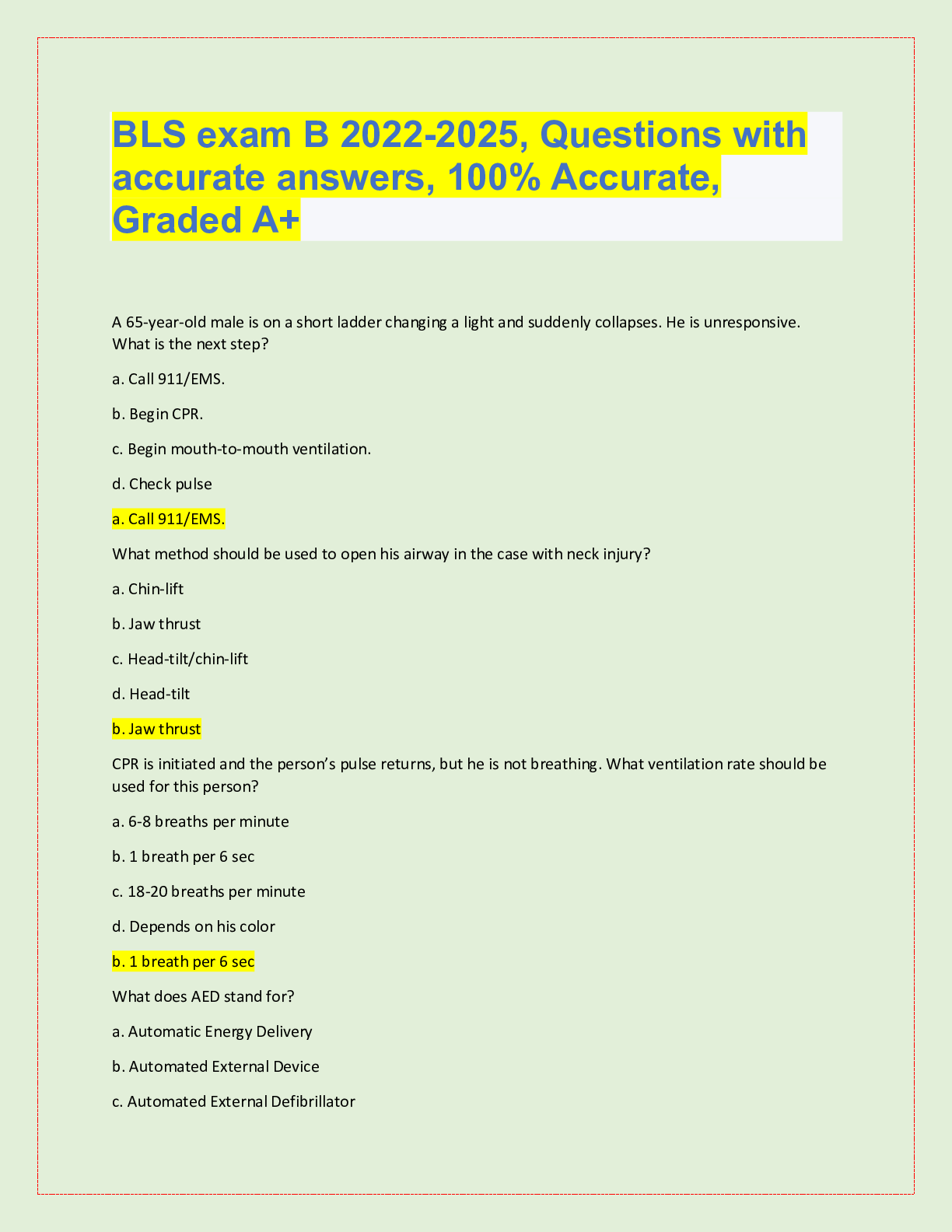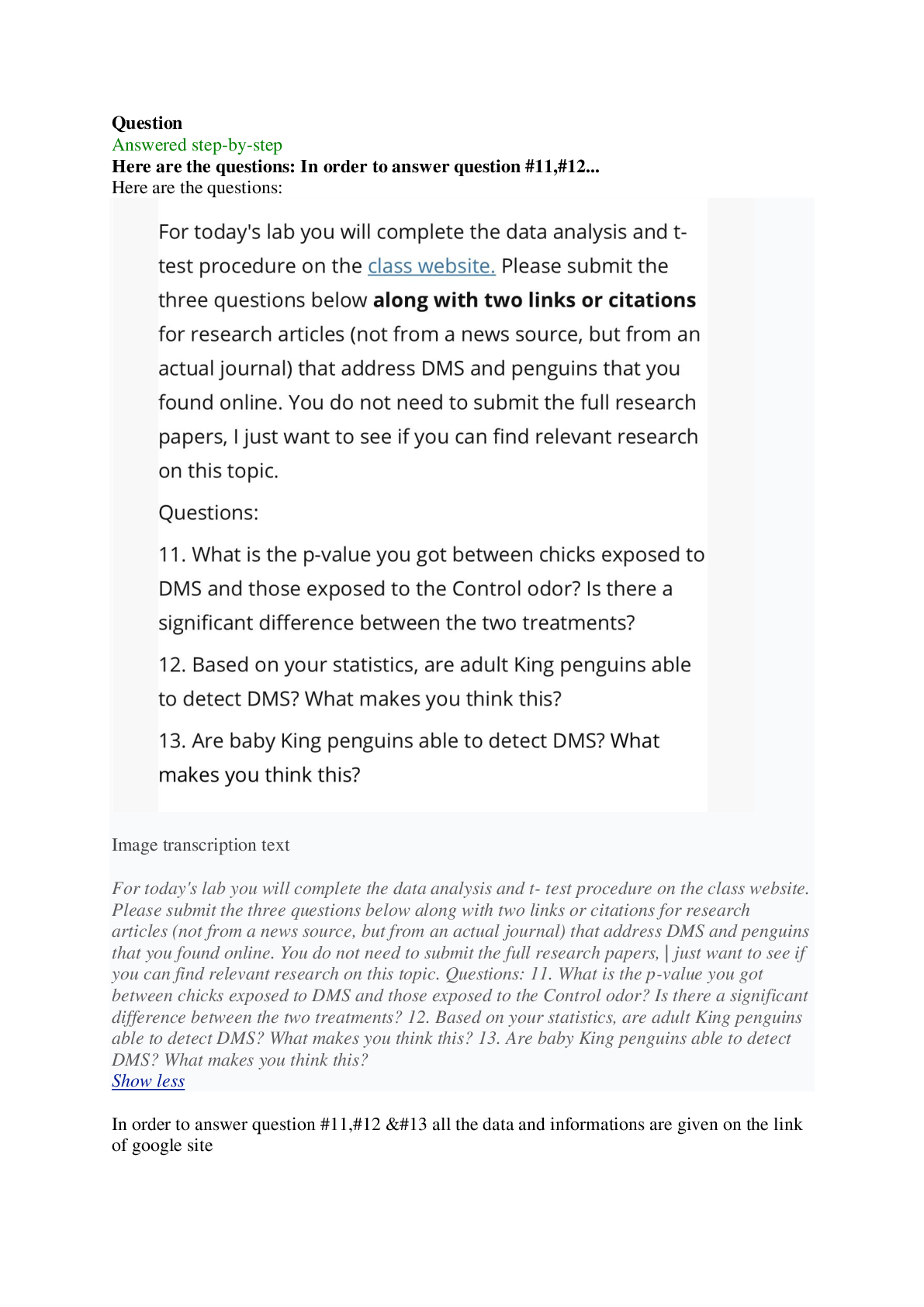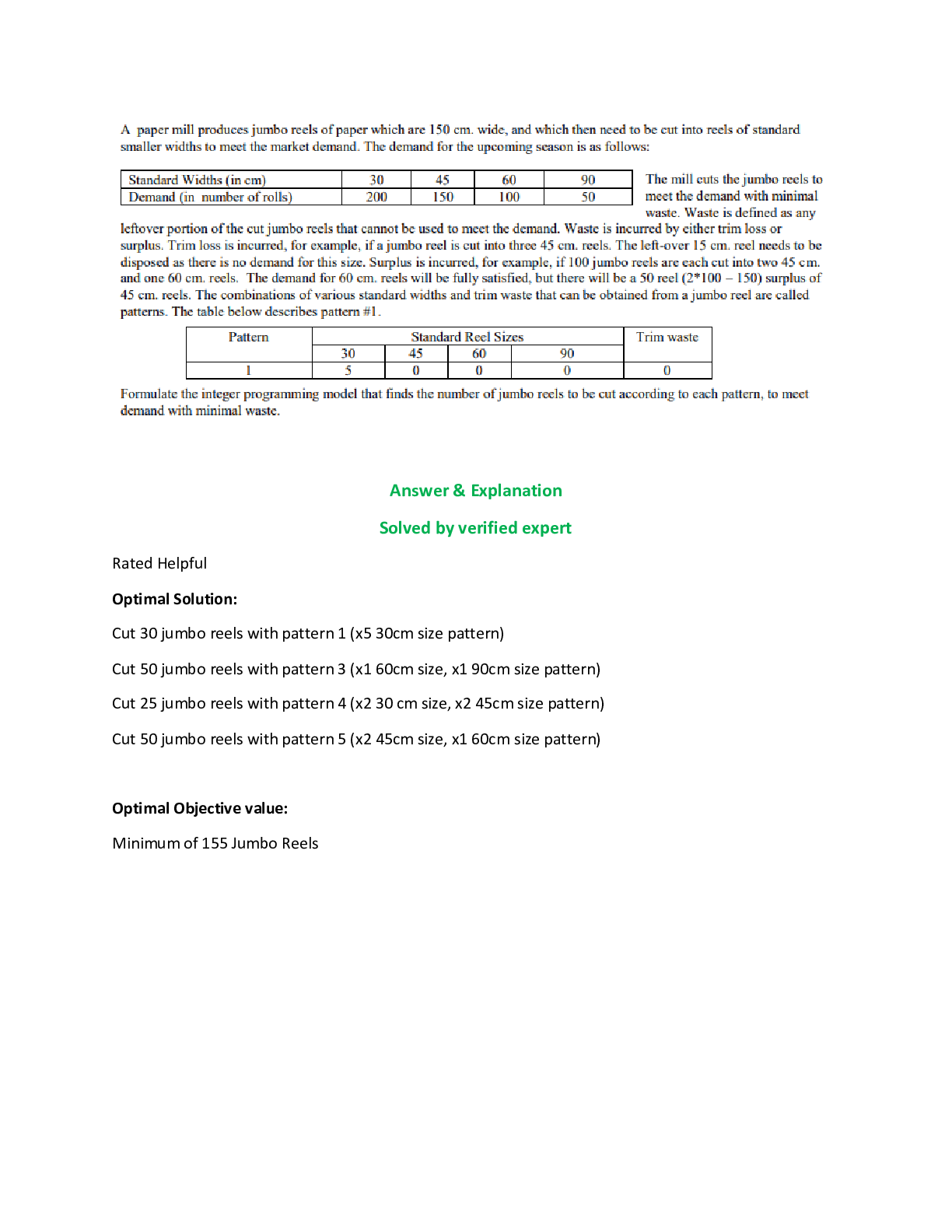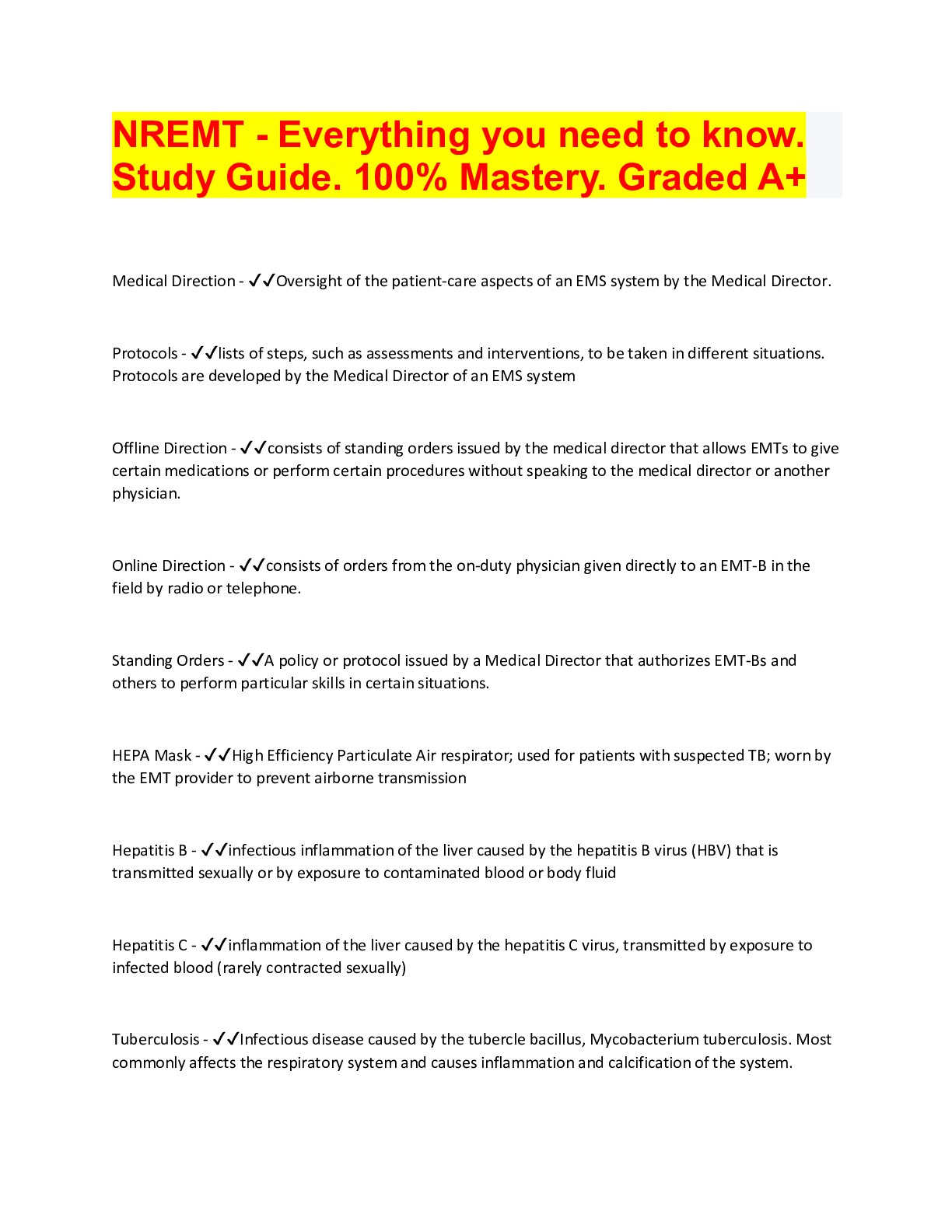Political Science > QUESTIONS & ANSWERS > WGU American Politics and the US Constitution C963/ Social Studies Boards, Complete masterpiece, a (All)
WGU American Politics and the US Constitution C963/ Social Studies Boards, Complete masterpiece, all you need to pass Exams.
Document Content and Description Below
WGU American Politics and the US Constitution C963/ Social Studies Boards, Complete masterpiece, all you need to pass Exams. Thomas Hobbes - ✔✔-English materialist and political philosopher... who advocated absolute sovereignty as the only kind of government that could resolve problems caused by the selfishness of human beings (1588-1679) one of the 1sts to contribute to the idea of a social contract- he claimed society is not something natural and immutable, but rather it is something created by us.... Instead of being passive members of society, we are its creator, and the society we create has the purpose of serving our needs. Therefore, *we are in control of society, rather than its being in control of us.* Thomas Hobbes was an English philosopher, considered to be one of the founders of modern political philosophy. Hobbes is best known for his 1651 book Leviathan, in which he expounds an influential formulation of *social contract theory*. State of Nature - ✔✔-theory, idea. A time period in history before any government, rulers, and kings. During this time period, people lived in "nature" and had NATURAL RIGHTS. natural rights - ✔✔-in nature, people had freedom of speech/press/vote, freedom of religion, freedom of assembly, freedom to protect themselves (with weapons), property rights, ect. John Locke- life, liberty and property **Natural Rights define out INDIVIDUAL IDENITY= Human nature. **Locke: yet it is hard and inconvenient to Live in Nature John Locke - ✔✔-17th century English philosopher who opposed the Divine Right of Kings and who asserted that people have a natural right to life, liberty, and property. English philosopher who advocated the idea of a "social contract" in which government powers are derived from the consent of the governed and in which the government serves the people; also said people have natural rights to life, liberty and property. Social Contract Theory - ✔✔-The belief that people are free and equal by natural right, and that this in turn requires that all people give their consent to be governed; espoused by John Locke and influential in the writing of the declaration of independence. social = society is created by the people. People come out of nature to create a society or nation. Contract= people create/vote for the laws, Governments, & Leaders... ...*an agreement between people and government where citizens consent to the government as long as the government protects their natural rights.* Sovereignty - ✔✔-The Power & Authority to Rule or Govern. We believe that Government's power comes from the consent, power and rights of the people. (Popular Sovernty) Consensual political rule - ✔✔-Majority Rule. People Vote (political equality) & whoever gets the most votes wins in our elections & laws what were the the primary goals of the Articles of Confederation? - ✔✔-to create a confederation of states whereby each state retained "its sovereignty, freedom, and independence, and every power, jurisdiction, and right...not...expressly delegated to the United States in Congress assembled." -to secure the blessings of liberty. no basic rights will ever be taken away. -to promote the general welfare. maintain order, regulate commerce, grant patents, protect individual liberties. -to provide for the common defense. ... -to insure domestic tranquility. ... -to establish justice. ... -to form a more perfect union. What was the structure of government under the Articles of Confederation? - ✔✔-1 house (I chamber) in a legislative branch. NO president, NO courts (no judiciary or executive branches) ONLY the legislative branch to pass laws....(Supposed to take care of Indian affairs, foreign relations, letting new states be formed, settle disputes, have a post office, deal with other countries, declare war) What were some weaknesses of the Articles of Confederation? - ✔✔-This congress in the legislative branch *could pass laws, but could not enforce them.* It was up to the states to enforce laws... because it could not enforce it's own laws; it could not tax the people, could not set up an army. There was no president, or courts. Kept falling deeper into debt. Too much power for the STATE government with a WEAK national, Confederation Government. We were basically acting like the Divided States of America...Every state government acted like it was it's own country. Every state printed it's own $$.. Every state was making it's own treaties with other countries (Supposed to be the confederate government's job...,but again, they could not enforce their own laws, and the states often opted not to follow their laws) ...after 5 years, it was a complete mess....led to the constitutional convention in Philadelphia in 1787. Constitutional Convention in Philadelphia in 1787 - ✔✔-they ended up deciding they couldn't fix the confederation government; and they needed to write a new government. (only 12 states came to this meeting...not 13. Rhode island did not come) Meeting took 100 Days! What was the Virginia Plan? - ✔✔-It was written by James Madison. -Proposed a new government with *3 branches* of government- legislative, executive, and Judicial -Proposed having TWO elected groups in the Legislative Branch (Or *2 chambers* -bicameral- means 2 groups or chambers) 2 different groups that have to agree for a new law to be written. -The House of Representatives should be elected by the people, and the Senate would be elected by the state legislatures. -*The number of elected representatives and senators would be based on population size of the states.* o Other Powers- The legislature could tax, regulate interstate trade, strike down unconstitutional state laws, and use armed forces to enforce. *Large states with higher population loved this plan...small states did not like the Virginia plan, and especially did not like the population size part of this plan.* What was the New Jersey Plan? - ✔✔-written by William Paterson "Father" - also wanted *3 branches of gov.* (leg, exec, and Judicial, - Proposed *1 chamber* (or house- unicameral.) - *All states should be represented equally, so- all states have the SAME vote and the SAME power.* What was the Great Compromise? - ✔✔-▪ Compromise (brought both Virginia and New Jersey plans together) proposed by *Robert Sherman* from Connecticut (Sometimes called the *Connecticut Plan*) • *The Legislative Branch would be based on Both population size and equal representation.* • *TWO groups or chambers* = Bicameralism o The House of Representatives would be elected directly by the people & be based on the POPULATION SIZE in each state (VA PLAN) o The Senate is where every state would be equally represented. (Two senators per State (NJ Plan) What is the Three-Fifths compromise? - ✔✔-Came about during/because of the Great Compromise. Now each state wanted as much population as possible for the proposed House of Representatives... -The 3/5ths compromise allowed states to count slaves as part of each of their populations size. *5 slaves = 3 votes.* At this time 10 out of the 13 states allowed slavery. (northern & southern states had slavery....after the constitution was written, it didn't take the northern states long to outlaw slavery.) 3/5ths compromised continued for a while later as the southern states continued to allow slavery. What were the Anti-Federalist's views on the scope and powers of the government? - ✔✔--Thought the new Federal Government was TOO big and too powerful, and would TAKE AWAY the rights of the people. -Wanted a *Bill of Rights* to Protect their liberties (*their STRONGEST argument*) - Thought the new president would turn into a king. What was the purpose and main arguments made in Federalist #10 - ✔✔--Pure democracies are short lived, full of conflict, volatility, and excessiveness. - *Factions*: o-*How can we keep our FREEDOMS and Prevent FACTIONS from taking over??* ▪ The principle tasks of modern legislation is "the regulation of these various and interfering interests" ▪ Also, Majority factions/groups could tyrannize minorities- called The "Tyranny of the Majority" **Madison explained that a "strong, extended Republic (Meaning the new, Strong Federal Government in the 2nd US Constitution)—splint into 3 branches with checks and Balances—will STOP extreme factions from taking over & PROTCT our liberties better than the Articles of Confederation. Factions - ✔✔-Groups such as parties or interest groups, which according to James Madison arose from the unequal distribution of property or wealth and had the potential to cause instability in government. "a number of citizens whether...a majority or minority who 1) are united and actuated by the same common impulse or passions or of interests, and 2) adverse to the rights of other citizens or to the permanent and aggregate interests of the community. What was the purpose and main arguments made in Federalist #51. - ✔✔-James Maddison explains the *3 branches of government*, their separate powers; why they needed to be separated, as well as explains all the *checks and balances* that they would have over each other to stop each other / prevent one branch from taking over. What is the purpose of having separations of powers? - ✔✔-Prevents monopoly of power or tyranny in one leader, one branch, or group. How are laws made and enforced using the separation of powers? - ✔✔--*Legislative Branch*- Senate & House of Representatives write & Propose Laws...average about 10,000 -proposed laws each year....1,000 proposed laws go to the president (*Executive Branch*)- Law enforcing Branch -When someone brakes a law- they go to the *Judicial Branch* (Law- interpreting Branch) Judges decide if they broke a law, and what punishment needs to be. What is a Republic? - ✔✔-- A form of government in which *power resides in the people (popular sovereignty)*. - People elect representatives who become the government. - Based on the "Rule of Law"- NOT the Rule of Men. Also embraces the idea of public virtue, an informed and active citizenry using Majority Rule. What is Checks & balances? - ✔✔--Give each branch scrutiny and control over the other 2 branches. -Extra Constitutional powers that allow each BRANCH to investigate, confirm or stop the other 2 branches. -Extra precautions against tyranny- a "double security" to our rights and liberties. What are some checks the judicial branch has on the legislative branch? - ✔✔-(Extra Powers the Supreme Court has OVER the Legislative branch/ Congress) ▪ Can overturn acts/laws of congress as unconstitutional if they violate the constitution = power of judicial review. ▪ Can influence laws by interpretation ▪ Serve during good behavior to maintain_________. What are some checks the judicial branch has on the Executive Branch? - ✔✔-(Extra powers that Supreme Court has OVER the President:) ▪ Can overturn action of the president with judicial review if the actions violate the Constitution= Power of Judicial Review ▪ Serve during good behavior to maintain independence of judiciary What are some checks the legislative branch has on the judicial branch? - ✔✔-(extra powers congress has OVER the Supreme Court/ Judges) ▪ Senate must approve judges and justices ▪ Controls jurisdiction of the courts ▪ Determines size of supreme court ▪ House can impeach judges and senate can remove them by 2/3 vote What are some checks the legislative branch has on the executive branch - ✔✔-(extra powers Congress has OVER the President): ▪ Can override a presidential veto by 2/3 vote in both chambers to make official law ▪ Must approve foreign treaties by a 2/3 vote in Senate ▪ Control of funding activities of the executive branch ▪ Presidential nominees must be approved by the senate ▪ Only congress can declare war ▪ House of representative can impeach the president or vice president and the Senate can remove them by a 2/3 vote. What are some checks the executive branch has on the legislative branch? - ✔✔-(Extra powers the President has to stop, approve, or do something over congress): ▪ Can Veto Legislation (reject proposed law) ▪ Can sign Legislation (to make a proposed law into an official law) ▪ Can make executive agreements with foreign nations ▪ Can use executive orders ▪ Negotiates foreign treaties (not Congress) What are some checks the executive branch has on the judicial branch? - ✔✔-(Extra powers the president has to stop, appove, or do something over the Supreme Court) ▪ Nominate Judges ▪ Power of Pardon What are some characteristics of a federal system of government (federalism) (articles 4&6) - ✔✔-o A Government structure with 2 MAIN LEVELS: a national Government (Federal Government) & a State Government level o Two Levels of Government over the Same Nation o Each level has sovereignty and constitutional power over their jurisdiction (or level) What are some advantages and disadvantages of a federal system (federalism)? - ✔✔-ADVANTAGES: -Federalism promotes political participation. -Federalism encourages economic equality across the country. -Federalism provides for multiple levels of government action. -Federalism accommodates a diversity of opinion. DISADVANTAGES: economic disparities across states, race-to-the-bottom dynamics (i.e., states compete to attract business by lowering taxes and regulations), and the difficulty of taking action on issues of national importance. o Small nations do not need to be split up into top level and state levels. England is the size of Colorado...it does not need to have Federalism. o Large Countries do have many different levels with different powers. What are Implied Powers? - ✔✔-Not listed in the Constitution. Allows Congress to carry out its constitutional powers. What is the Necessary and Proper Clause? - ✔✔-(also called the "Elastic Clause")- falls under implied powers. The Congress shall have power to make all laws which shall be necessary and Proper for caring into Execution the foregoing Powers, and all other Powers vested by this Constitution in the Government of the united states or in any department or officer thereof. What are some examples of some implied powers? - ✔✔-Implied Powers = Elastic Clause= Necessary and Proper Clause ¨ Stretches the powers of Congress to include o Health care reform o Jobs programs o Transportation o Social welfare o Education o National security What are some examples of implied v. enumerated powers? - ✔✔-• Congress can create a national bank (implied) so that it can collect taxes and regulate currency (enumerated) • Created the IRS (Internal Revenue Service) so they can have an agency to regulate those taxes (implied) • Congress can set a federal minimum wadge (implied) that allows it to execute its power of regulating interstate trade/commerce (enumerated) • *Implied powers tend to be more modern sounding & specific....things we can see congress doing today that they wouldn't have thought of back in the day.* • *Enumerated powers tend to be more broad* What are Enumerated Powers? - ✔✔-o Powers of Congress that are specifically mentioned/ listed in the constitution -tend to be more broad What are some examples of enumerated powers? - ✔✔-▪ Power to tax ▪ Power to create post offices ▪ Power to Build roads ▪ Commerce Clause Power to regulate interstate commerce (trade that passes state lines or US with other nations) ▪ Power to borrow money and coin money ▪ Power to declare War ▪ Power to give advice and consent (senate can give advice and consent on presidential appointment and treaties) ▪ Power to impeach the president and judicial officials. What are Inherent Powers? - ✔✔-o also not listed in the constitution; *VERY broad* ▪ Power's congress must have "if the government is going to work at all" ▪ Powers that any nation needs to have. Examples: • Define borders of the US • Expand their territory • Defend nation from internal revolution What are some checks and balances The House of Representatives has with the other branches of government? - ✔✔-▪ Starts Impeachment Process (investigating and charging presidents or federal judges ▪ Introduce bills on new taxes & spending What are some checks and balances The Senate has with the other branches of government? - ✔✔-(deal with checking the president in some way) ▪ Confirm/ approves presidential appointments ▪ Ratify (approve) treaties made by the president (2/3 vote) ▪ Holds impeachment trial; votes to remove from the office (Constitution says the president can be impeached for treason, bribery, and other high crimes and misdemeanors. Its kind of vague, so it is up to congress to determine what it is means Why does the Senate have more power than the House? - ✔✔-Because of it's size...(100 senators vs. 435 representatives) =Allows the senate to act more quickly -More freedom/ leeway to debate important issues How Congress is Organized - ✔✔-▪435 Representatives (set by congress by law) ▪ States are divided up into congressional districts (each are = in population) ▪ Each representative represents a district ▪ Serve for 2 years Senate ▪ Equal # of senators for every state (2 per state) ▪ 100 members ▪ Senators represents an entire state ▪ Serve 6 year terms ▪ 1/3 of the senate is elected every 2 years. (always have some senators who have some experience.) political socialization - ✔✔-▪ People form their political values and beliefs over time though a process called political socialization Republicans - ✔✔-tend to be more conservative ▪ Limited role of national government to enhances individual liberty (personal freedoms) ▪ Free markets- limit government regulation of the economy/business ▪ Also believe government should provide order (law & order, social order- more traditional values when it comes to marriage, relationships, reproduction) Democrats - ✔✔-tend to be liberal ▪ Expanded role of national government to promote equality (Equal access to health care, education, housing, getting rid of discrimination in terms of race, national origin, ethnicity, sexual orientation, gender.) ▪ Government should step in to regulate economy/business (should not be such a big gap between the wealthy and the poor, equality) The Majority Party - ✔✔-The party that has the most seats in the House or the Senate How does a bill become a law? - ✔✔-If a bill has passed in both the U.S. House of Representatives and the U.S. Senate and has been approved by the President, or if a presidential veto has been overridden, the bill becomes a law and is enforced by the government. o Can start in either the House or the Senate -sub committee (committee on a very specific issue area) -Committee (broader issue area) -Floor of the house/ Senate (once it passes one of these; then it has to start all over again with the other chamber) -gets introduced -sub committee -committee -then the floor of the opposite house/chamber to pass that chamber. In order for a bill to go to the president; it has to pass both chambers in the same version. If one chamber amends/ changes the bill in any way; then a conference committee is called. Which involves members of both chambers, where they work out any differences that they had, and resolve difference. -New compromised version is sent back through the full process. Once passed by both chambers it goes to the president who can either sign it or veto it. -IF a bill gets vetoed; they send it back to Congress with a memo about why it was vetoed. Congress either has to accept it, make changes, or they can override a president's veto with a 2/3 vote in the house & the senate. (president's veto power is an example of how he can check congress; but their ability to override a veto is a way for them to check him back.) o After a bill is introduced, it is assigned to a committee who revies bills from a particular policy area (ex) a bill on student loans would go to the Education and Labor Committee Congressional Committees - ✔✔-o hold hearings- committees hear from experts, interest groups or members of the public, learn pros/cons of a bill o Bills can be amended o Committee holds a vote to send it to full chamber or not What are some types of Congressional Committees? - ✔✔-· Standing Committee- Permanent, covering long-lasting issues (budget education) 1) Budget Committee- "Big Picture" of spending; sets maximum limits (Department of Education has a budget of $68 billion) 2) Appropriations- Allocates Specific funds to different areas/programs (department of Education has $68 billion to spend, so $5 billion will go to improving reading instruction; $3 billion will go to student debt relief, ect) · Select Committee- temporary, formed to address a specific issue · Joint Committees- have members from both the house and the senate; cover issues like taxation · Conference Committee-involve both the house & senate called to resolve difference between house and senate bills; are formed just to consider a SINGLE BILL once they resolve difference; the committee is dissolved. Why do we have Congressional Committees? - ✔✔-o Division of labor (education bills go to the education committee, veterans bills go to the veterans committee) o Allow members of Congress to develop a specialty (it would be impossible to be a specialist in all areas, but can become an expert in 1 area, and be on that committee) Help members of Congress pursue constituents' interests (constituent is a resident of a member of Congress', their district or their state, a person represented by that member of congress....a member of congress from Iowa would want to sit on the agricultural committee to show the state that they are working for their interests Reapportionment - ✔✔-o Redistribute the seats in the House based on population changes (happens after every census- 10 years) ▪ House seats are apportioned through the Equal proportions method which uses a mathematical formula to distribute seats to the states in a fair manner ▪ Ensures the populations in congressional districts are about equal ▪ On average, on representative for every 747,000 Americans. Redistricting - ✔✔-o - State Governments re-draw congressional district boundary lines based on their population changes (Florida is gaining population, so they will gain a representative or two...they then need to redraw their district lines for which area their representatives are over so they can squeeze in their new representatives) ▪ Happens after reapportionment ▪ Can happen in between reapportionment if needed (if states population shifts within the state (a lot of people move to the urban areas, then they may need to even things out again) Gerrymandering - ✔✔-o In most states, it is the state legislatures that draw the district lines...this can be problematic because the governments are controlled by political parties; and the republicans or democrats in the state government often want to help out their fellow democrats or republicans in congress; and can draw district lines in a way to benefit their party to ensure that a certain party wins a district..._gerrymandering- is redrawing a congressional district to intentionally benefit a particular group or political party. Racial gerrymandering- boundary lines are drawn to pack of voters together of a particular racial group so that a certain candidate win; but that is unconstitutional and can not be a controlling factor in forming districts anymore....when it comes to parties though, the Supreme Court has left that up to Congress to pass laws about whether gerrymandering can happen. ▪ Named after a governor form New Jersey named Elbridge Gerry, who oversaw the drawing of these districts in his state that had these very weird shapes (lizard or salamander like shapes) because he was trying to pack a lot of people from one party into each [Show More]
Last updated: 2 years ago
Preview 1 out of 110 pages
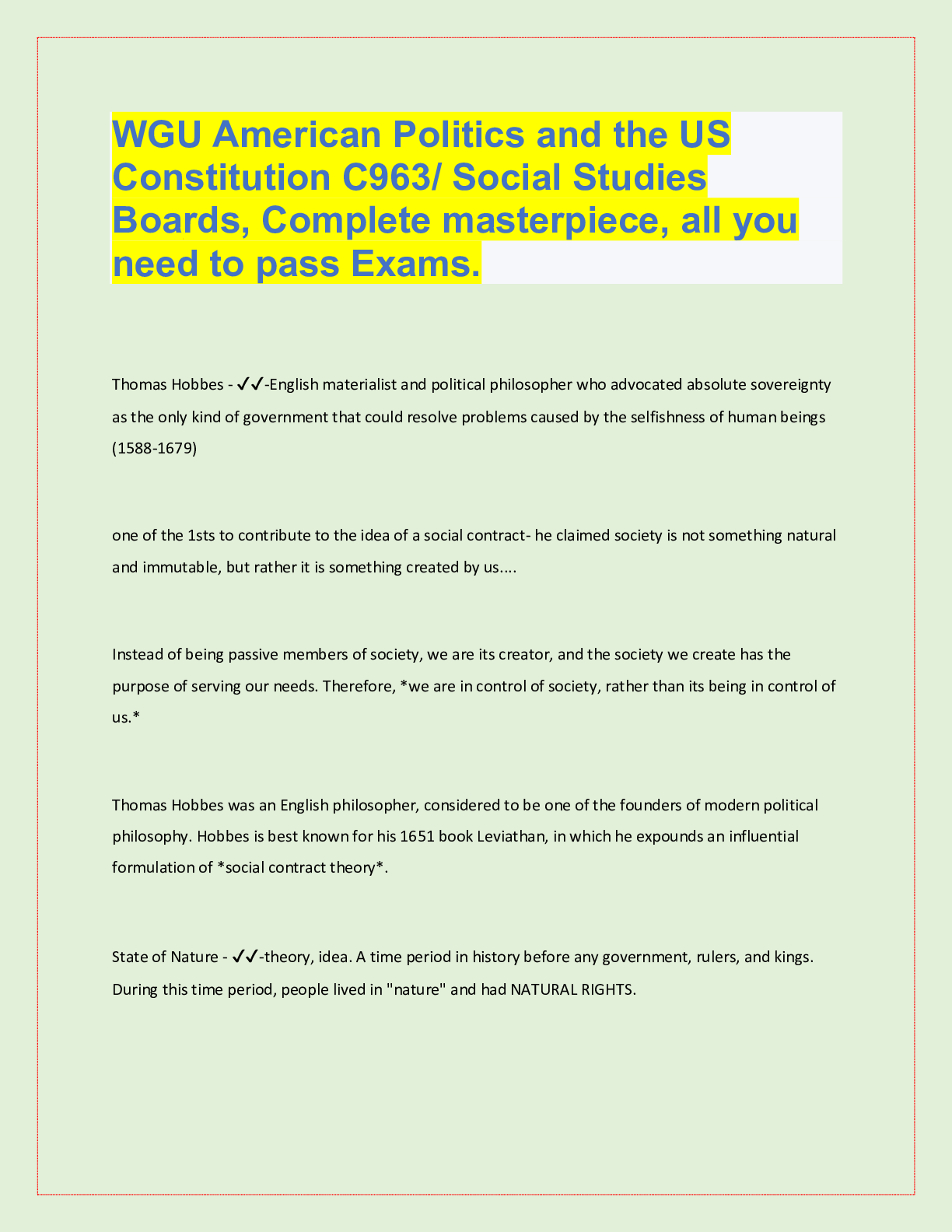
Buy this document to get the full access instantly
Instant Download Access after purchase
Buy NowInstant download
We Accept:

Also available in bundle (1)

WGU C963 EXAM BUNDLE, VERIFIED, RATED A+
American Politics and the US Constitution –WGU C963. Exam Questions & Answers, ;LATEST VERSIONS Graded A+. Verified
By Topmark 2 years ago
$32
27
Reviews( 0 )
$14.00
Can't find what you want? Try our AI powered Search
Document information
Connected school, study & course
About the document
Uploaded On
Mar 13, 2023
Number of pages
110
Written in
Additional information
This document has been written for:
Uploaded
Mar 13, 2023
Downloads
0
Views
114

